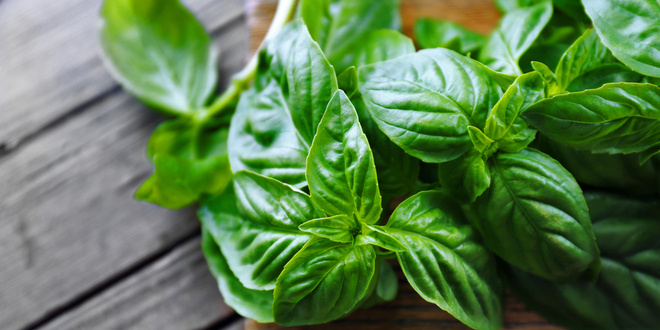The green shiny-leaved, aromatic plant known as basil has been called the “royal herb” by the French, and it has been regarded positively and even ritually by many religions and cultures. According to Jewish tradition, sniffing the leaves makes people stronger while fasting on Yom Kippur.
Some Christians present the herb as a gift to others on religious holidays, while priests in the Greek Orthodox Church use it to sprinkle holy water and the ancient Egyptians and today’s Hindus place the leaves in the hands of the deceased to “speed their journey to heaven.” But ancient Greeks viewed basil as a symbol of hatred.
The name comes from the Latin and words for “royal/kingly plant,” perhaps because the plant was thought to have been used in production of perfumes for kings and queens.
Today, basil is highly regarded by chefs and cooks who offer a large variety of cuisines. The herb is packed with vitamins such as B1 , B2 and B3, beta-carotene, vitamin C and K and minerals such as magnesium, iron, copper, calcium, phosphorus, potassium and manganese.
The herb is native to India and other warm regions from Africa to Southeast Asia, but it is now grown around the world. While it grows best in soil outdoors, it can grow quite well even indoors on a sunny windowsill. Even if it dries out a bit, giving it a dousing with water may help it to recover; it can be grown even from cuttings placed in water to root and then to be transferred to a pot or earth.
It is one of the leading three herbs marketed in Europe, with mint and coriander. Its distinct aromatic qualities make it a favorite of the culinary world, But the herb suffers from several plant diseases that can ruin the crop and because of its soft delicate leaves, it is unusually demanding to cultivate. Basil requires a minimum of five hours of sunshine daily and thrives in warm, temperate subtropical climates. It is highly sensitive to cold, making northern Europe a less-than-ideal location for growing basil. Basil also carries a characteristically short shelf life, as its tender leaves blacken and wilt easily.
Now, the Israeli agritech startup named Future Crops, Ltd. is boosting output of a pure, high-yielding basil variety it successfully adapted for cultivation in the company’s primarily solar powered 2,000-square-meter vertical farm. The company says that its advanced, clean-farming technique for this aromatic basil variety will ensure a long shelf life and secure a steady supply of locally grown, pesticide-free herb to the European market.
The proprietary seeds were developed at the Israeli Agricultural Research Organization (ARO) by Prof. Nativ Dudai, head of the ARO’s unit of medicinal and aromatic plants. Dudai is considered a prominent global figure in the mapping, breeding and development of basil varieties, and his research team was the first in the world to sequence the whole sweet basil genome.
“Most of the basil varieties today have been developed to grow in the outdoors in open fields as well as greenhouses,” said Dudai. “Our goal was breeding varieties that would best fit the novel vertical farming paradigm. Our breakthrough in sequencing the basil genome gave us the modern molecular tools for developing cultivars imbued with very specific desired genetic characteristics. We in particular searched for such traits as resilience to environmental stressors, yield capabilities, as well as flavor and textural properties.”
Thanks to extensive shared agronomical know-how and access to Dudai’s impressive seed bank and database, basil seeds embodying all the desired traits were selected and brought together via a process of natural breeding in order to create the perfect seed for cultivation in a vertical farm. This was achieved without genetic modifications or editing.
Dudai said that the team has developed a number of different herb seed varieties using this method. The startup has signed an agreement with the ARO Institute to buy exclusive licensing rights to these seeds for commercialization worldwide.
Future Crops developed ideal climate conditions for its basil, helping it to thrive year-round even during the cold Dutch winter. Equipped with precision agricultural technology, this easily recognized basil crop is grown on a unique, nutrient-enriched soil-like substrate, with all cultivation parameters including light, temperature, wind, and humidity fully controlled.
“Plants behave very differently in closed environments versus in an open field,” noted Gary Grinspan, the CEO and cofounder of Future Crops. “We are constantly observing and tuning into their growth needs to mimic the outdoor field ambience as much as possible.” As a result of these arduous measures, Future Crops’ vertically farmed basil has almost tripled its yield over the last three years and boasts a shelf life that stretches over two weeks under optimum storage conditions. It also possesses a distinctive, appealing flavor and fragrance that captivates chefs and is completely free of pesticides.
“Our basil has received excellent feedback from Genoa residents, who claim it to be as good as the globally renowned Genovese basil,” Grinspan added. Genovese basil is considered to be the gold standard in basil cultivation, unmatched in quality and flavor, and a favorite of pesto producers.
Future Crops grows a range of basil varieties, including cinnamon, lemon, lime, and Thai basil. With a focus on the retail and food service sectors, the company says it is also targeting food producers, especially makers of pesto.
“We have been able to supply a premium pesto brand with basil that was not appropriate for retail but ideal for use as the base for a condiment,” said Grinspan. “This proved instrumental in reducing waste while enabling us to provide high-quality product at a reasonable cost, thus using 100% of the crop and contributing to sustainable sourcing and farming.”
Future Crops is continuously improving its basil crops. Its team of agricultural experts is now working to further increase yields significantly by the end of the year to deliver customers fragrant basil at peak freshness.
The shortcode is missing a valid Donation Form ID attribute.




